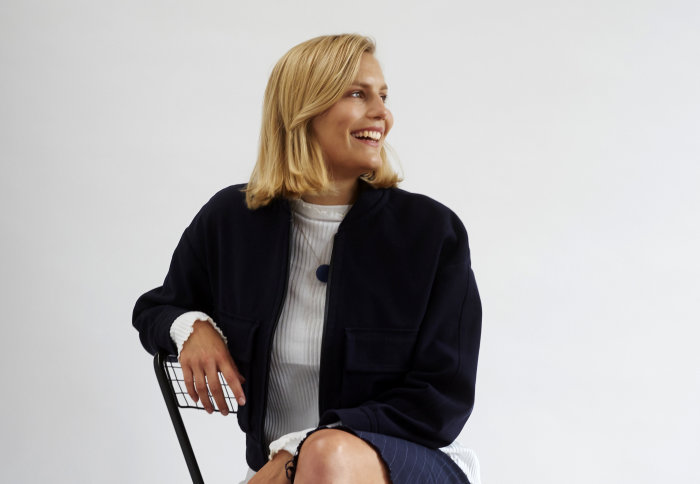Imperial innovators are “changing the face of science and technology”

Imperial entrepreneurs are among Europe’s most outstanding young innovators, according to MIT Technology Review’s annual ‘Innovators Under 35’ list.
Imperial graduates Christina Friis Blach Petersen, founder of light-sensing wearable developers Lys Technologies, and Henrik Hagemann, founder of White City based industrial wastewater treatment system CustoMem, have been listed in the 35 European Innovators Under 35 of 2018.
The list recognises those whose work has the potential to “shape the coming decades” and solve some of the world’s biggest problems.
Understanding the impact of light
Christina Friis Blach Petersen is on a mission to help office workers and city-dwellers understand the importance of light on their health and wellbeing.

The biological processes of living beings are shaped by their sleep-wake cycle, known as the circadian rhythm and marked by the alternation between light and darkness.
But Christina says modern urban life means people are spending increasing amounts of time in front of screens or exposed to artificial light in office buildings, which can upset their sleeping patterns, mood and appetite.
Her solution is Lys, a small wearable device, around the size of a two pound coin, which tracks the kind of light a wearer is exposed to throughout the day. It measures the intensity and colour of the light, and provides advice and feedback to the user to make their routines healthier.
The device is now on sale in 11 countries, after Christina raised more than £55,000 in a crowdfunding campaign.

Emmanuelle Tognoli, associate professor of Complex Systems Research and Brain Science at Florida Atlantic University (USA) and member of the jury of Innovators Under 35 Europe 2018, called Christina’s project "excellent" and said that the data collected by LYS "can be very useful for understanding the impact of urban lifestyles on sleep and, perhaps, could lead to corrective action in urban designs in the long term." He also praised her "skills and interdisciplinary vision".
Christina was was a student on the Innovation Design Engineering course run jointly by Imperial and the Royal College of Art . In 2016 she was a finalist in Impeiral’s WE Innovate programme (formerly known as the Althea-Imperial Programme), the College’s entrepreneurial programme for women. Speaking on a panel discussion about the programme last year, Christina said: “I definitely wouldn’t have this company if it weren’t for the programme. To begin with it was just a creative university project – I didn’t consider it from a business perspective at all. The programme made me look at it through a business lens, and helped me figure out the right route to take.”
Tackling water pollution
Henrik Hagemann co-founded CustoMem with fellow Imperial student Gabi Santosa in 2017. The company has developed a unique chemical process which can capture and hazardous micropollutants found in industrial wastewater.
 Current water treatment methods often leave behind contaminants such as pesticides, pharmaceuticals and high performance chemicals in wastewater. These pollute global freshwater supplies. According to the Water Status report, published by the European Environment Agency in July 2018, only 40% of surface waters such as lakes, rivers, estuaries and coastal waters meet the minimum target of ‘good’ ecological status.
Current water treatment methods often leave behind contaminants such as pesticides, pharmaceuticals and high performance chemicals in wastewater. These pollute global freshwater supplies. According to the Water Status report, published by the European Environment Agency in July 2018, only 40% of surface waters such as lakes, rivers, estuaries and coastal waters meet the minimum target of ‘good’ ecological status.
Hangemann and his team have initially focused on capturing Polyfluoroalkyl substances (PFAS) from industrial wastewater. PFAS are man-made chemicals used in industry and consumer products such as non-stick cookware, water-repellent clothing, stain resistant fabrics and firefighting foams.

These chemicals are very persistent in the environment, meaning they can accumulate over time. There is also evidence that exposure to PFAS can lead to adverse human health effects.
CustoMem have developed a product, known as CustoMem Granular Media (CGM) which can selectively capture PFAS so that they can be safely removed and disposed of. The material can also be customised to capture different kinds of contaminants.
CustoMem say that in its first tests, CGM has proven to be ten times more efficient to eliminate PFAS and 40% cheaper than its main competitor in the market. They have already tested their product at an airport in Germany, and plan to implement it in a London airport.
Grzegorz Wróblewski, Associate Professor of the Warsaw University of Technology and jury member of the Innovators under 35 Europe 2018, said that this project is capable of “helping to protect the environment on a global scale”.
Gabi Santosa, co-founder of CustoMem, won Imperial’s WE Innovate programme in 2016. The team are now based at the College’s White City Incubator, and earlier this year they received a €1.4m grant from the EU’s Horizon 2020 programme to bring their innovative water filtration system to market. They have previously been supported by EIT Climate-KIC, based at the Grantham Institute – Climate Change and The Environment.
Article text (excluding photos or graphics) © Imperial College London.
Photos and graphics subject to third party copyright used with permission or © Imperial College London.
Reporter
Deborah Evanson
Communications Division